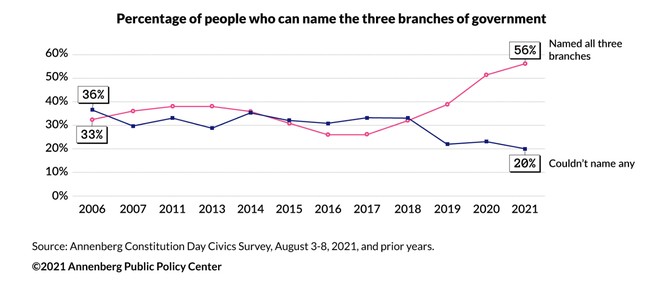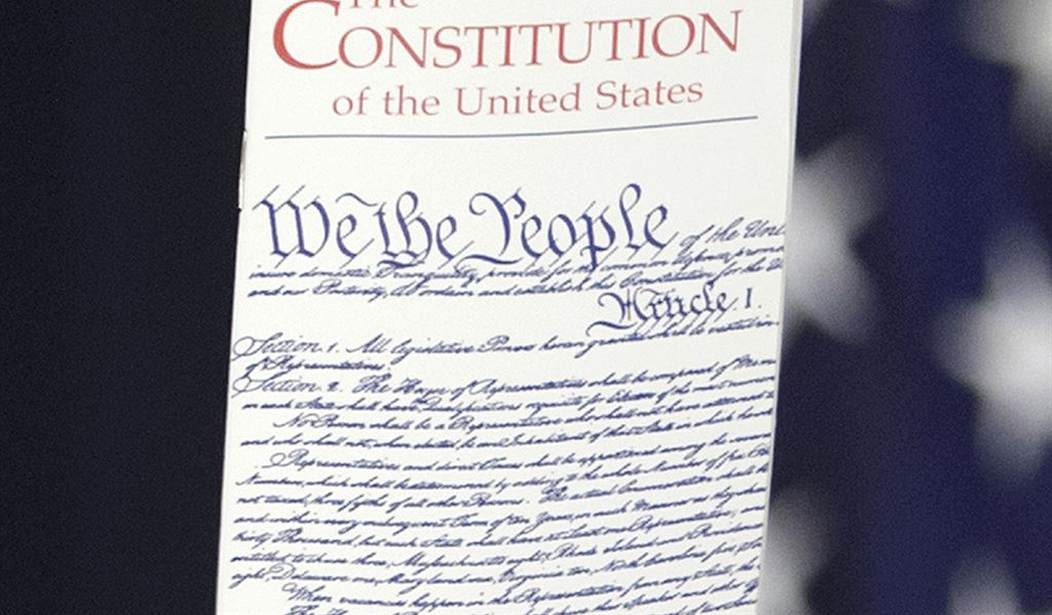There’s at least some evidence pointing towards the idea. Every year the Annenberg Public Policy Center does a survey of Americans’ knowledge of civics as part of its celebration of Constitution Day, and this year’s poll found a substantial increase in the number of Americans who can correctly answer some basic questions about how our government is supposed to work, even as our political divides grow deeper.
Let’s start with the good news. According to Annenberg, more Americans could identify the three branches of government this year than in any of their previous polls dating back to 2006.

The bad news, of course, is that close to half of all respondents could name the judicial, legislative, and executive branches. Still, it’s a sign of progress than only 1 in 5 Americans couldn’t name a single branch, considering the fact that for most of this century about a third of us drew a complete blank when asked that question.
The Annenberg Center’s survey didn’t ask any questions about the Second Amendment, at least none that they’ve revealed at the moment, which I find rather odd given the surge in gun purchases and the number of new gun owners over the past 20 months or so. I would have loved to have seen some questions relating to the right to keep and bear arms, because I’m pretty sure that we’ve seen some growth in the number of Americans who can not only identify what the Second Amendment is all about, but view their right to own and carry a gun as a good thing.
While the survey was silent on the Second Amendment, respondents were asked several questions about their First Amendment rights. Again, the results were something of a mixed bag.
Asked to name the protections specified in the First Amendment, as many people or more could name most of the freedoms guaranteed by the First Amendment as were able to do so last year. Three-quarters (74%) named freedom of speech, statistically the same as in 2020 (73%). Freedom of religion was named by 56% (up from 47%), freedom of the press by 50% (up from 42%), and the right to petition the government by 20% (up from 14%). Three in 10 (30%) mentioned the right of people peaceably to assemble, compared with 34% in 2020, when the survey was conducted during a summer of widespread protests.
The folks at the Annenberg Center are a little upset, however, about the response they received when they asked about free speech and Facebook.
Six in 10 Americans (61%) incorrectly believe it is accurate to say that the First Amendment protection of freedom of speech means that Facebook must permit all Americans to freely express themselves on Facebook pages. The First Amendment protects citizens from government censorship. Social media companies such as Facebook are private companies and courts have ruled that private entities are not covered by it.
Facebook blocked Donald Trump from its platform after January 6, 2021, on the grounds he was using the platform “to incite violent insurrection against a democratically elected government,” in the words of Facebook CEO Mark Zuckerberg.
According to Annenberg’s survey, 66% of self-described conservatives said that the First Amendment protects Facebook posts, but so did 61% of self-described moderates and 55% of self-described liberals. That’s important, because while it is true that the First Amendment only protects against suppression of speech by the government, it’s also clear that many Americans view Facebook and other social media platforms as the online equivalent of the public square, and that’s going to continue to have an impact on how lawmakers approach the issue.
All in all, I’d say the survey shows some positive developments with regards to how we view our individual rights and how much we know about our system of government, but with nearly half of Americans still unable to answer basics like the three branches of government, its clear that we also have a long way to go before we can consider ourselves a constitutionally literate society. If political division really is forcing more of us to do our civics homework, however, it shouldn’t be long at all before we’ve all got the equivalent of a PhD in political science.









Join the conversation as a VIP Member